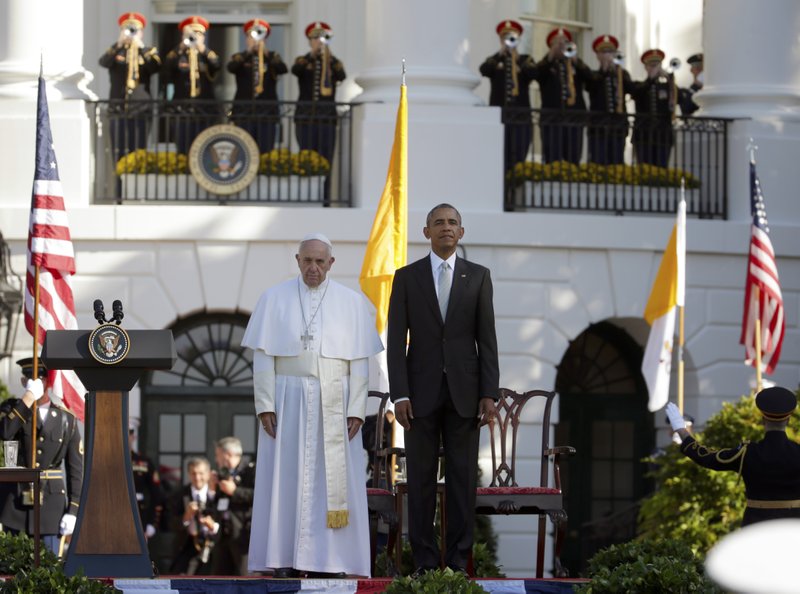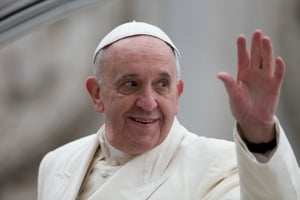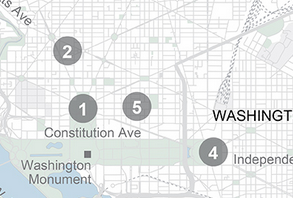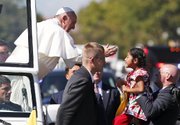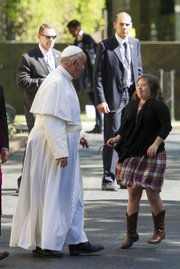WASHINGTON -- Jubilant crowds greeted Pope Francis in the nation's capital Wednesday where he spoke on climate change, immigration and economic inequality, and signaled that he would not sidestep issues that have deeply divided Americans.
RELATED ARTICLES
http://www.arkansas…">Arkansans line up for peek at pontiff http://www.arkansas…">In U.S. ceremony, pope makes 18th-century friar a saint
On his first full day in the United States, the pope also reached out to the nation's 450 bishops, gently prodding them to forgo "harsh and divisive language," and commending their "courage" in the face of the Catholic Church's sexual-abuse scandal.
Excited crowds lined the streets near the White House to catch a glimpse of the smiling and waving Francis, 78, as he passed by in his open-air "popemobile." He seemed to draw energy from the spectators, particularly from the children his security detail escorted to him for his blessing.
The tight security around Francis got its first test Wednesday when a 5-year-old California girl, with a T-shirt and a message about immigration for the pontiff, made her way through a security barrier and onto his parade route.
Sophie Cruz of suburban Los Angeles initially shied away as a pair of security officials approached her, but Francis encouraged her to approach him. She was quickly whisked to Francis' popemobile, where the pope gave her a hug and kiss.
In keeping with his reputation as the "people's pope," Francis kept President Barack Obama and other dignitaries at the White House waiting, as he spent time greeting schoolchildren gathered outside the Vatican's diplomatic mission where he spent the night.
With flags snapping, a color guard at attention and a military band playing, Francis stepped onto the White House South Lawn on a crisp fall morning. Pope and president stood on a red-carpeted platform bedecked with red, white and blue bunting for the playing of the anthems of the Holy See and the United States.
The pope's remarks were brief, yet pointed.
Speaking in soft, halting English, Francis said that as the son of an immigrant family, he was "happy to be a guest in this country, which was largely built by such families." The Argentine pope was born to Italian parents who left their home country before he was born, and he has been a forceful advocate for humane treatment of foreigners.
Francis was enthusiastic in his embrace of Obama's climate-change agenda, specifically praising the president for taking steps to reduce air pollution. In a message to those who doubt the science of climate change, he said the warming planet "demands on our part a serious and responsible recognition" of the world that will be left to today's children.
"Accepting the urgency, it seems clear to me also that climate change is a problem which can no longer be left to a future generation," said Francis, who has been pressing his environmental message ahead of climate-change talks in Paris later this year.
The pope's messages were warmly welcomed by Obama, who has prodded his Republican rivals for action on immigration and climate change with limited success. In remarks heralding the pope's arrival at the White House, Obama thanked Francis for reminding the world of the "sacred obligation to protect our planet -- God's magnificent gift to us."
The pope and president were also aligned in their call for addressing global poverty and inequality, with Obama praising Francis' call to put "the least of these at the center of our concern."
The pope had something for conservatives, too. He made a clear call to protect religious liberties -- "one of America's most precious possessions."
"All are called to be vigilant," he said, "to preserve and defend that freedom from everything that would threaten or compromise it."
U.S. bishops and conservatives, who have objected to the Obama administration's health care mandate and the recent Supreme Court legalization of same-sex marriage, have made religious freedom a rallying cry, with a largely domestic focus.
After their opening remarks on the lawn, Obama and Francis met for 40 minutes in the Oval Office, joined only by an interpreter. White House aides said the discussion was private and declined to say what subjects the leaders addressed.
Today, Francis planned to deliver the first papal address ever to Congress, speaking to Republican-majority legislators at odds with Obama on many of the same issues the leaders addressed at the White House.
Francis' visit to the United States is primarily for the World Meeting of Families in Philadelphia, a triennial Catholic conference being hosted in the U.S. for the first time.
Pope draws praise
While the pope's Washington visit was analyzed for political implications in a city already consumed by next year's U.S. presidential election, for Catholics and many other Americans, Francis' six-day, three-city trip to the U.S. is an opportunity to connect with a humble church leader who has rejuvenated many of the country's believers.
"He's made the church more of an obtainable thing," said Nigel S̶t̶a̶c̶y Stacey*, a law student who arrived at the White House in the middle of the night to secure a good place to stand for the arrival ceremony. "It's more relatable. You see what he does, and you can see yourself emulating that."
Washington resident Theresa Wellman, who took her mother and five children to watch the pope's parade through the streets of the nation's capital, called Francis "a breath of fresh air."
"He's changed the tone into a loving, merciful church to serve the poor," Wellman said.
Many non-Catholics joined the throngs, as well.
"I believe he's a world leader more than a religious leader," said Sasha Datta, a practicing Hindu. "His openness, his ability to not shy away from real issues -- I see a lot of hope when I see people like Pope Francis."
Datta, who works in finance and is in her mid-40s, said her admiration for Francis stemmed from their shared values of working for the poor and the marginalized.
"The fact that this pope is pushing this agenda, I love it, because that's what God's people are supposed to do," she said. "Take care of people."
Cynthia Olmstead, 49, of South Yarmouth, Mass., who identifies as a secular humanist, said she admired his message of inclusiveness, tolerance, social justice and environmentalism. She said she lived in Argentina when Cardinal Jorge Mario Bergoglio made headlines there for taking public transit and mingling with the poor. Now, she said, she is hoping to take her children to New York to see Pope Francis.
"I know it sounds strange, but I just feel like it would be a moving experience to see him," she said. "It's almost like if you've gone to see any kind of civil-rights leader speak, and they have a kind of universal message, and even if you don't necessarily belong to that ethnic group or religious group, you're moved by the message."
The church's leadership in the U.S. has sometimes been more skeptical of the pope, wary of the divide between his focus on a merciful church and the culture wars that the United States' bishops have been involved in over abortion and gay rights.
In his remarks to U.S. bishops at the Cathedral of St. Matthew the Apostle, Francis emphasized one of the defining messages of his papacy, to focus less on defending church teaching and more on compassion. The pope told U.S. church leaders that "harsh and divisive language does not befit the tongue of a pastor," and he encouraged them to speak with anyone, no matter their views.
In his first comments in the U.S. on the clergy sex-abuse scandal that was revealed in 2002, the pope praised the bishops for a "generous commitment to bring healing to victims" and for acting "without fear of self-criticism."
An organization for abuse victims quickly disagreed.
"Almost without exception, they have shown cowardice and callousness and continue to do so now," said Barbara Dorris, president of Survivors Network of those Abused by Priests.
Under public pressure, the U.S. Conference of Catholic Bishops pledged to oust any guilty clergymen from church work and enact safeguards for children. However, some victims say the bishops still haven't fully accounted for sheltering abusers. This year, three bishops resigned over their failures to protect children.
Information for this article was contributed by Julie Pace, Nicole Winfield, Nancy Benac, Darlene Superville, Kevin Freking, Stacy A. Anderson, Juliet Linderman, Jessica Gresko, Rachel Zoll, Alicia A. Caldwell and staff members of The Associated Press; and by Vivian Yee and Alan Feuer of The New York Times.
A Section on 09/24/2015
*CORRECTION: The last name of Nigel Stacey, a law student who attended an arrival ceremony for Pope Francis outside the White House, was misspelled by The Associated Press in an earlier version of this article on the pontiff’s visit to Washington.
